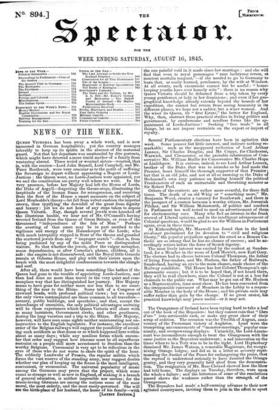Several Parliamentary elections have been in agitation this week. Some
possess but little interest, and indicate nothing re- markable; such as the unopposed reelection of Lord Arthur Lennox, Sir Charles Douglas, and Mr. Cripps for Chichester, Warwick, and Cirencester, or the probable substitution of Con- servative Mr. William Baillie for Conservative Mr. Charles Hope at Linlithgow. It is curious, indeed, to see Lord Arthur Lennox, brother of the Duke that was to unmake as he had made the Premier, boast himself the thorough supporter of that Premier; but that is an old joke, and not at all so amusing as the Duke of Richmond's own easy patience on finding himself the political Frankenstein of such an untractable and theorizing monster as Sir Robert Peel.
Others of the contests are rather more eventful, for these dull times. The death of an old Whig or " something more," Mr. Benjamin Wood, creates a vacancy for Southwark ; and there is the prospect of a contest between a worthy citizen, Mr. Jeremiah Pilcher, and Sir William Molesworth, of politics and conduct in Parliament too well tested to need an advertisement of them for electioneering uses. Many- who feel an interest in the frank avowal of Liberal opinions and in the intelligent advancement of Colonial questions, would be glad to see Sir William in Parliament again, even in these times. At Kirkcudbright, Mr. Maxwell has found that in the land soi-disant preeminent for its devotion to "civil and religious liberty," the popular prejudices against his creed as a Roman Ca-. tholic are so strong that he has no chance of success ; and he ac- cordingly retires before the force of Scotch bigotry. The most lively interest was excited by the contest at Sunder- land, for a Member in the room of Lord Howick, now Earl Grey. The electors had to choose between Colonel Thompson, the father of living Free-traders, and Mr. Hudson, the father of Railways. Sunderland, having an eye to the main chance, made choice of the Railway candidate. The House has lost Colonel Thompson's epi- grammatic essays; but it is to be hoped that, if not heard there, they will be read elsewhere, since the Colonel is not at a loss for channels to the public ear. What may be got out of Mr. Hudson as a Representative, time must show. He has been converted from the irresponsible canvasser of Members in the Lobby to a respon- sible Member in the body of the House ; and his private ends may suffer rather than gain by the change. If no great orator, his practical knowledge may prove useful—or it may not.


























